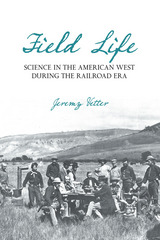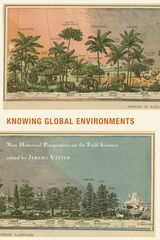2 books about Vetter, Jeremy

Field Life
Science in the American West during the Railroad Era
Jeremy Vetter
University of Pittsburgh Press, 2016
Winner, 2018 HSA Phillip J. Pauly Prize
Field Life examines the practice of science in the field in the Great Plains and Rocky Mountains of the American West between the 1860s and the 1910s, when the railroad was the dominant form of long-distance transportation. Grounded in approaches from environmental history and the history of technology, it emphasizes the material basis of scientific fieldwork, joining together the human labor that produced knowledge with the natural world in which those practices were embedded.
Four distinct modes of field practice, which were shared by different field science disciplines, proliferated during this period—surveys, lay networks, quarries, and stations—and this book explores the dynamics that underpinned each of them. Using two diverse case studies to animate each mode of practice, as well as the making of the field as a place for science, Field Life combines textured analysis of specific examples of field science on the ground with wider discussion of the commonalities in the practices of a diverse array of field sciences, including the earth and physical sciences, the life and agricultural sciences, and the human sciences.
By situating science in its regional environmental context, Field Life analyzes the intersection between the cosmopolitan knowledge of science and the experiential knowledge of people living in the field. Examples of field science in the Plains and Rockies range widely: geological surveys and weather observing networks, quarries to uncover dinosaur fossils and archaeological remains, and branch agricultural experiment stations and mountain biological field stations.
Field Life examines the practice of science in the field in the Great Plains and Rocky Mountains of the American West between the 1860s and the 1910s, when the railroad was the dominant form of long-distance transportation. Grounded in approaches from environmental history and the history of technology, it emphasizes the material basis of scientific fieldwork, joining together the human labor that produced knowledge with the natural world in which those practices were embedded.
Four distinct modes of field practice, which were shared by different field science disciplines, proliferated during this period—surveys, lay networks, quarries, and stations—and this book explores the dynamics that underpinned each of them. Using two diverse case studies to animate each mode of practice, as well as the making of the field as a place for science, Field Life combines textured analysis of specific examples of field science on the ground with wider discussion of the commonalities in the practices of a diverse array of field sciences, including the earth and physical sciences, the life and agricultural sciences, and the human sciences.
By situating science in its regional environmental context, Field Life analyzes the intersection between the cosmopolitan knowledge of science and the experiential knowledge of people living in the field. Examples of field science in the Plains and Rockies range widely: geological surveys and weather observing networks, quarries to uncover dinosaur fossils and archaeological remains, and branch agricultural experiment stations and mountain biological field stations.
[more]

Knowing Global Environments
New Historical Perspectives on the Field Sciences
Vetter, Jeremy
Rutgers University Press, 2011
Knowing Global Environments brings together nine leading scholars whose work spans a variety of environmental and field sciences, including archaeology, agriculture, botany, climatology, ecology, evolutionary biology, oceanography, ornithology, and tidology.
Collectively their essays explore the history of the field sciences, through the lens of place, practice, and the production of scientific knowledge, with a wide-ranging perspective extending outwards from the local to regional, national, imperial, and global scales. The book also shows what the history of the field sciences can contribute to environmental history-especially how knowledge in the field sciences has intersected with changing environments-and addresses key present-day problems related to sustainability, such as global climate, biodiversity, oceans, and more.
Contributors to Knowing Global Environments reveal how the field sciences have interacted with practical economic activities, such as forestry, agriculture, and tourism, as well as how the public has been involved in the field sciences, as field assistants, students, and local collaborators.
Collectively their essays explore the history of the field sciences, through the lens of place, practice, and the production of scientific knowledge, with a wide-ranging perspective extending outwards from the local to regional, national, imperial, and global scales. The book also shows what the history of the field sciences can contribute to environmental history-especially how knowledge in the field sciences has intersected with changing environments-and addresses key present-day problems related to sustainability, such as global climate, biodiversity, oceans, and more.
Contributors to Knowing Global Environments reveal how the field sciences have interacted with practical economic activities, such as forestry, agriculture, and tourism, as well as how the public has been involved in the field sciences, as field assistants, students, and local collaborators.
[more]
READERS
Browse our collection.
PUBLISHERS
See BiblioVault's publisher services.
STUDENT SERVICES
Files for college accessibility offices.
UChicago Accessibility Resources
home | accessibility | search | about | contact us
BiblioVault ® 2001 - 2024
The University of Chicago Press









